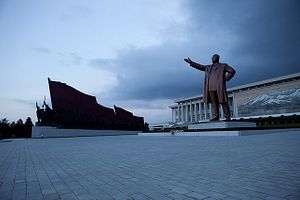On April 11, the North Korean Constitution was amended by the Supreme People’s Assembly. Details of the amendment were only disclosed three months later.
The Socialist Constitution of the Democratic People’s Republic of Korea was originally written in 1972 and has been amended a number of times since. This latest amendment is noteworthy in that it revealed the increasingly dynastic features of the Kim family.
The first feature of the amendment is that it took “the Great Kimilsungism-Kimjongilism” and made it “the one and only guiding principle for nation-building and activity.” Until the latest amendment, the Constitution stipulated that the national ideology would be “the juche (self-reliance) idea, the songun (military first) idea.” These expressions have now been deleted from the amended Constitution. The juche idea had been in the constitution for 46 years and four months.
The fact that the amendment included the language “the Kimilsungism-Kimjongilism,” which directly names past leaders in the provisions of the Constitution, and not the name of ideology they initiated, suggests that the regime of their successor, Kim Jong-un, is becoming a more personal rule. In North Korea, the Constitution is a mirror to reality.
In addition, the current leader was named in the Constitution for the first time. The amended Constitution stipulates that the mission of North Korea’s armed forces is to protect the Central Committee of the Workers’ Party of Korea headed by the Great Comrade Kim Jong-un with resolute courage. Kim Il-sung and Kim Jong-il were expressly included in the Constitution in September 1998 and April 2012 respectively, but in both cases this was only after their deaths, and they were only named in the preamble.
In the preamble to the amended Constitution, Kim Il-sung and Kim Jong-il are mentioned 24 and 18 times, respectively, in admiration for their achievements. The latest version of the preamble, just like the previous version, discusses the nature of the Constitution, stipulating that it is “the Kim Il-sung and Kim Jong-il Constitution that legalizes Kim Il-sung and Kim Jong-il’s ideology and achievements of nation-building.”
However, Kim Il-sung and Kim Jong-il were mentioned in the previous preamble using the expressions “the Comrade Kim Il-sung” and “the Comrade Kim Jong-il” for the second and subsequent uses. In the latest amendment, all mentions were changed to “the Great Leader Comrade Kim Il-sung” and “the Great Leader Comrade Kim Jong-il,” further reinforcing the personality cult.
The second feature of the amended Constitution is that it defined “the chairman of the State Affairs Commission assumed by Kim Jong-un” as “the supreme leader who represents the state,” that is, the head of state, for the first time. Although the Constitution before its amendment defined the chairman of the State Affairs Commission as “the supreme leader,” there was some room for interpreting the international role of head of state as being given to the President of the Presidium of the Supreme People’s Assembly . Likely it was felt necessary to put Kim Jong-un on an equal footing with US President Donald Trump and Chinese President Xi Jinping, both heads of state, as he became more confident through his summit diplomacy over the last year.
The language “nuclear-weapons state” remained an achievement of Kim Jong-il’s in the preamble of the amended Constitution. The language was expected to be deleted if North Korea could get the United States to partially remove a set of economic sanctions. But the second U.S.-Korea Summit in Hanoi, Vietnam, at the end of February did not go that far. This suggests that future U.S.-Korea negotiations are likely to be difficult.
In the latest amendment, other changes could be seen throughout the Constitution. One is North Korea’s focus on expanding and developing external economic relations. The Kim Jong-un regime clarified a policy shift from “songun” in the reign of Kim Jong-il to economic construction.
The Constitution had long included provisions about foreign trade. However, the latest amendment altered it from “developing foreign trade based on the principle of complete equality and reciprocity” to “protecting credit, improving the trade structure and expanding and developing external economic relations based on equality and reciprocity.” This change underscores Pyongyang’s recognition of the importance of protecting credit and its ambition to improve its trade structure.
Without progress in U.S.-North Korea consultations over nuclear issues, it is difficult to imagine that these efforts will bear fruit. Still, the policy should be seen as the Kim Jong-un regime’s ideal vision.
The pursuit of economic construction has been behind North Korea’s diplomatic offensive since last year. In connection with this aim, it is worth noting that the Foreign Affairs Commission was specified as one of the commissions to be established in the Supreme People’s Assembly. The Foreign Affairs Commission was reestablished in April 2017, after a 19-year hiatus, in the Supreme People’s Assembly.
All of which makes clear that North Korea will continue to pursue a diplomatic offensive while bolstering its defense capabilities.
Atsuhito Isozaki is an associate professor at Keio University.

































